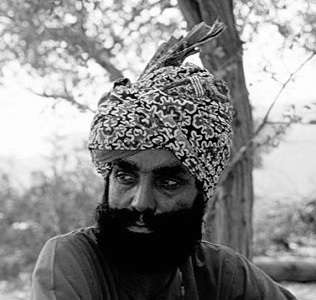Allan Fakir
| Ali Bux Alias Taunwer Faqir | |
|---|---|
 | |
| Born |
1932 Aamri village, Taluka Manjhand, Jamshoro, District, Sindh, Pakistan |
| Died |
4 July 2000 Karachi, Pakistan |
| Resting place | Housing society Jamshoro (in his own home) |
Allan Fakir (1932– 4 July 2000)[1] (Sindhi: اَلڻُ فقيرُ, Urdu: الن فقیر), was a Pakistani folk singer. One of the foremost exponents of sufi music in Pakistan. He was particularly known for his ecstatic style of performance, marked with extreme devotional rhetoric and Sufi dance singing.
Early life
Allan Fakir was born in 1932 in the ancient village of Aamari in Jamshoro District, Sindh. Allan's mother died soon after giving birth. He spent his childhood in Manjhand, a town between Sehwan and Hyderabad, Sindh.
He belonged to Mangrasi tribe, the Manganhars are believed to bring happiness and welcomed on festive occasions for their gift of melody. According to the traditions of this caste, Allan Fakir's father used to beat the drum and sing traditional songs at weddings and Faqir's brothers still do the same job.
Fakir is an Arabic word, and implies a Sufi or a mystic. Thus in the real sense of the word, a 'Fakir' is someone who leads an independent life marked by piety, abstinence from material needs, and contentment in the available resources. It must not be confused with the rather loose usage of the same word implying a beggar, in the local languages Sindhi and Urdu.
When he was only a teenager, Allan developed a habit of singing melancholy songs, which were not liked by his father. Deprived of a motherly love, he went off in search of someone who could replace that love. He arrived at the tomb of Shah Abdul Latif Bhitai at Bhit Shah, where he started living.
Allan's memory was quite sharp, even though, he could not read and write. He was touched by heart hearing the traditional 'Latifi Raag' every night. Encouraged by Faqir Zawar Qurban Ali Lanjwani and Moolchand Maharaj, Allan began singing Bhitai's poetry at the shrine and ultimately spent next twenty years there, until meeting with Mumtaz Mirza who introduced him to Radio Pakistan and Pakistan Television Corporation in Hyderabad, Sindh and helped him to learn the correct pronunciation of Bhitai's poetry.
Allan became a performing legend eventually.
Work
His songs, mostly in Sindhi language except a few in Urdu, usually revolve around Sufism and the devotional philosophy. But the characteristic which distinguishes him from many other folk singers, is the depth of his feelings, which is very expressive in all of his songs.
One of his famous songs is a duet with Muhammad Ali Shehki, "Tere Ishq Mae" which became a huge hit and tremendously increased his popularity. A patriotic song "Itne bare jeewan saagar main" also got popular.
Honors and awards
In appreciation of his services to folk culture, he was given a job and a small house at the Institute of Sindhology.
- Allan Fakir received the following awards
- President's Pride of Performance award in 1980
- Shahbaz Award in 1987
- Shah Latif Award in 1992
- Kandhkot Award in 1993
Death
Allan Faqir died on July 4, 2000, at Liaqat National Hospital, Karachi. He died after suffering a paralysis attack. His death created a void in Pakistan, one that might never be filled.[2]
See also
|